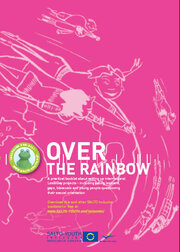Finding partners for LesBiGay projects
- Find this and more in the SALTO Inclusion for All booklet: Over the Rainbow
Some suggestions for partner finding
There are many sources of information that can help you identify potential partners for projects. Here is a non-exhaustive list:
Within the European Union's YOUTH programme there are a variety of tools to help you find a partner group (for an exchange) or a project (for a voluntary service):
- Most National Agencies (NAs) in the Youth in Action programme have some kind of partner request form usually in electronic format on their homepage. The NAs forward your completed form to one or more of the other NAs located across Europe. Find a list of NAs at http://ec.europa.eu/youth/youth/contacts_en.htm
- Some National Agencies also have a partner finding database online, e.g. the German and British NAs - you can locate these databases via the SALTO partner finding page at www.SALTO-YOUTH.net/partnerfinding/
- If you are looking for a host organisation for a European Voluntary Service project, you will find a host organisation database at http://ec.europa.eu/youth/evs/aod/
- Some centres for Regional Co-operation have addresses of youth organisations in so-called "partner countries" with whom YOUTH programme projects are possible. e.g. SALTO Eastern Europe & Caucasus: www.SALTO-YOUTH.net/eeca/, SALTO South East Europe: www.SALTO-YOUTH.net/see/, the EuroMed platform for co-operation with EuroMed countries: www.euromedp.org
Europe-wide networks and umbrella organisations can provide you with names and contacts of organisations in different countries
- Post a note on the forum of www.iglyo.com (International Lesbian Gay Bisexual Transgender Queer Youth and Student Organisations). The IGLYO website aims to gather organisations that are looking for partners under the Youth (in Action) program.
- European Youth Forum: www.youthforum.org and its many member organisations: international youth NGOs and National Youth Councils
While participating in various Training Courses (TC), Contact Making Seminars (CMS), or Short Study Visits (SSV), you may well meet youth workers from potential partner organisations. Information about different training opportunities can be found on www.SALTO-YOUTH.net/training/ or from your National Agency.
^^ top ^^
Building a healthy partnership
It is not difficult to build a partnership, however it does require some work. It is essential to go one step further to create a partnership where youth workers and volunteers feel they can trust each other, learn from each other, work together, exchange ideas freely about the project and initiatives.
It involves more than just finding a partner organisation and getting along with a youth worker abroad: the main issue is how to retain and work with this partner. The following are some elements that you may have to reflect on in your partnership!
- Based on the Training-Kit on Social Inclusion available from www.SALTO-YOUTH.net/InclusionPublications/ and www.youth-partnership.net
Are your organisations compatible?
- Do your organisations share common aims? Or are they at least compatible?
- Do the organisations work with a similar target group (age, mix, gender, educational background, geographical situation)? And if not how will you deal with the differences?
- Do your organisations have similar activities? Would you find a programme in common that both organisations are happy with?
- Do you have similar organisational capacities (size of the organisation, budgets, available networks)? Or would you find ways to work together on an equal footing?
- Do you have similar organisational cultures/ways of working? Or at least the openness to adapt to different ways of working? Are the differences in approach reconcilable?
- Do you have efficient channels of communication? A common working language?
- Do you have similar legal requirements (health & safety, needed qualifications, alcohol & drugs policies, etc.)? Are they compatible?
Of course no two organisations are completely the same and share all the above elements. It is important to be flexible, but also to be conscious of how you will deal with the differences. The more similar your organisations are, the easier the co-operation, but perhaps less to be learnt from each other.
^^ top ^^
What are you looking for in a partnership?
- What is your motivation behind the partnership? What is the position and recommendations of the board of management? Be clear on what you want the partnership to be and not to be!
- What do you expect to benefit from the partnership? For the organisations? For the target group? Which benefits are most important to you, and which are less important?
- What are the concrete needs and the resources available to invest in the partnership (staff, volunteers, time, money, material, etc.)?
- Are there external factors that are pushing you toward a partnership or keeping you from establishing one (funding, politics, etc.)?
- Will the partnership be balanced (equal contributions, equal benefits, equal involvement, etc.)?
Developing a project together
- Common aims: What are the common aims of the project? What possibilities do both organisations feel can be achieved together?
- Type of activities: What types of activities can the different partners work together on? Which activities would they prefer not to co-operate on? And why?
- Evaluation criteria and monitoring: What criteria do the partners use to monitor and evaluate projects and the partnership? At which intervals? What would be the limit of acceptance?
- Partnership Timetable: What is the timespan for the project? The co-operation timespan? What deadlines must the partners adhere to?
- Distribution of tasks: Who does what? How flexible and reliable is the process for distributing tasks? What backups are foreseen?
- Budget and resources: What resources, both human and financial, will each organisation commit to the project?
- Co-operation between organisations and groups: How will the youth workers and the young people in both organisations contact each other? How could they get to know each other better?
- Training needs: If there are certain skills lacking in the organisations, how will you overcome this? Do you foresee training, job-shadowing, etc?
- Communication and coordination: How will you keep all stakeholders informed about the project? How are you going to ensure regular contact between the partners? What needs and what doesn't need to be communicated/reported? How will you make decisions?
- Agree on the final project plan. It is important to make sure that the plan is agreed upon by the decision making body of the various organisations involved. Ensure organisational support for and commitment to the project.
^^ top ^^
 Inclusion: Providing a World
Inclusion: Providing a World
of Opportunities
 www.salto-youth.net/
www.salto-youth.net/
OverTheRainbow/
Downloads
The following downloads are available:
- Over the Rainbow - international LesBiGay projects - 2008 update
Inspiration & advice for setting up respectful projects with young gay lesbian bisexual people. Lots of information about project management, finding partners, funding,... Based on SALTO TC Rainbow 2005
